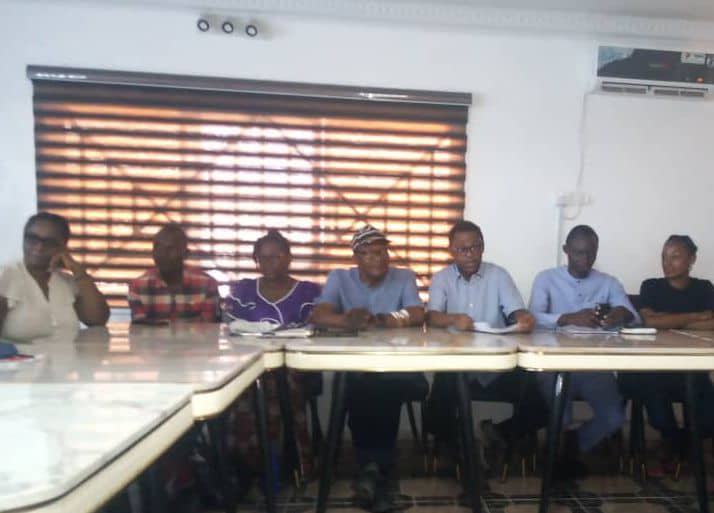…..Says Worship Centers, Farmlands, Homes Schools, Markets, Health Centers Destroyed In Five Council Wards
Benue Non Governmental Network (BENGONET) have registered it’s dismay over the suffering and neglect of the over 150,000 persons that were displaced by armed herdsmen attacks from five council wards in Kwande Local Government Area (LGA), that were living under harsh conditions.
The group observed that worse still the Internally Displaced Persons (IDPs), who were yet to be situated in an IDP camp, six months after the state government made a promise to get them settled in an IDP camp, were going through harrowing situations which has brought about malnourished children.
Speaking at a press conference held in Makurdi on Wednesday, Chairman, BENGONET, Lazarus Mom, explained that what the organization saw on ground in Jato-Aka where the displaced persons were packed together like in a can of sardines, was of deep concern, observing that it was a testament of prolonged suffering and neglect of a people who have been displaced from their ancestral homes.
He observed that while worship centers, homes and farmlands among other facilities have been destroyed by the marauding herdsmen in five council wards of Kwande LGA, over 5,700 lives have been lost in the area since the attacks began in 2011.
Mom explained that BENGONET arrived at the figures after an assessment of the root causes, as well as extensive discussions with community members, including, men, women, community leaders, the physically challenged as well as children.
The BENGONET chairmen who argued that unregulated open grazing and the poor enforcement of the Anti-Open Grazing Law, has led to recurrent attacks by armed herders, lamented that the Kwande attacks have been grossly under-reported, even though communities in the area have been under attacks since 2011.
Mom said, “We are gathered here today following a crucial two-day field visit to Jato-Aka town and surrounding communities within Kwande LGA. This visit was undertaken with the primary objective of understanding the root causes of the prolonged crisis in the region, gathering community perspectives on sustainable peace building, assessing humanitarian impacts, and identifying practical avenues for immediate support to affected populations.
“Over the course of this mission, more than 699 individuals were directly engaged, representing a diverse cross-section of the community. What we heard and observed painted a deeply concerning picture—one of prolonged suffering, insecurity, and neglect.
“Key findings from the field indicate that over 5,700 lives have been lost since the crisis began in 2011 and more than 150,000 persons have been displaced from their ancestral homes.
“There is widespread destruction of homes, farmlands, schools, health centers, markets, and places of worship.
The socio-economic and cultural fabric of entire communities has been decimated”, he stated.
While he stated that some of the root causes to the attacks include, unresolved boundary disputes and competition over mineral-rich lands
between the Turan community of Benue state and the Jukun communities of Taraba state among other issues, he suggested that the Federal Government (FG), among other solutions facilitate a high-level dialogue between the Benue and Taraba state governments, in collaboration with the National Boundary Commission, to resolve the long-standing boundary disputes.
According to him, “Root causes identified
based on extensive discussions with community members, that were also identified as core drivers of the crisis are unresolved boundary disputes between Turan and Jukun communities, intensified by competition over mineral-rich lands; unregulated open grazing and poor enforcement of the Anti-Open Grazing Law, leading to recurrent attacks by armed herders.
“Insufficient security presence before and after attacks; communities demand a permanent military/security base; poor road infrastructure, which hampers emergency response and movement of people and goods and absence of formal IDP camps or coordinated humanitarian response, despite years of displacement.”
Mom, however recommended for the
immediate intervention of Government, adding that “In light of these findings, we respectfully call on Government and all relevant stakeholders to act without delay; facilitate high-level dialogue between the Benue and Taraba State Governments, with the National Boundary Commission, to resolve the long-standing boundary disputes.
“Enforce—and where necessary, review—the Anti-Open Grazing Law to ensure better protection of rural communities; establish a permanent security outpost within Turan to serve as a deterrent and rebuild community trust; construct strategic access roads to improve security logistics and community connectivity and support community vigilante groups with logistics and training, under the supervision of formal security agencies, to enhance grassroots security.”
The BENGONET chairman further noted that what the organization has done was “a call for action. It is a cry for justice, for safety, and for the restoration of human dignity in our communities. We urge the government, civil society, and international partners to heed this call and respond with the urgency and compassion it deserves.
“We stand ready to support in any way necessary to restore peace and rebuild hope in Turan and its neighboring communities, he said.
He also stressed the need for the Benue State Emergency Management Agency (SEMA) to partner with the National Emergency Management Agency (NEMA), to set up a formal IDP camp in Kwande LGA and also roll out a comprehensive and coordinated humanitarian support for the displaced persons in the area.












